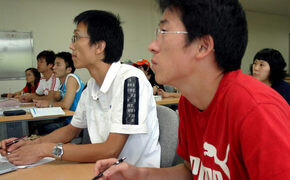hankyoreh
Links to other country sites 다른 나라 사이트 링크
TOEFL, GRE takers head to Japan

Kim was planning to attend university abroad, so he went to apply to take the Test of English as a Foreign Language (TOEFL). But when he logged onto the TOEFL Web site, he discovered that all testing sites were full through the end of the year. There was word that there would be an additional testing session added in December, but it was only an unsubstantiated rumor.
Meanwhile, Park, another student with hopes of studying abroad, had to go to Osaka, Japan, to take his Graduate Record Exam (GRE) late last month due to the fact that the test is only given twice a year in South Korea.
Upon arrival in Japan, Park was surprised that there were so many South Koreans in the Japanese city. He estimated that about 80 percent of the test-takers there were Korean.
These episodes highlight the difficulties faced by South Koreans seeking to go overseas for study. The reason is the lack of testing sessions in South Korea for exams such as the TOEFL and the GRE, which are required by many English-language schools for overseas applicants.
In South Korea, paper-based GRE tests take place only twice a year, compared with in Japan where computer-based tests are administered almost daily. The U.S.-based Electronic Testing Service (ETS), which writes and administers the TOEFL and the GRE, decided to cut the number of tests in South Korea, citing suspiciously high average TOEFL and GRE scores among test-takers there.
Against this backdrop, tour packages have become popular among people seeking to take the test overseas. One package provides applicants with a two-day stay in Osaka for 390,000 won (US$400). "About 200 people buy the package each month, and the number is growing on average 10 percent every month," said the head of one travel agency.
According to industry sources, around 6,000 people go to Osaka to sit for the GRE every month. The so-called "GRE tour" leads South Koreans not just to Osaka but also to Tokyo, Singapore, and the Philippines.
The TOEFL, too, is no exception. According to statistics released by the ETS, a total of 102,000 South Koreans applied for the English test between July 2004 and July 2005. That number was more than double the 50,311 recorded four years earlier, making South Korea the world’s largest market for the TOEFL.
But there is only one educational center exclusively dedicated to administering the test in South Korea, compared with four places in Japan. There were two more of these education centers, one in Seoul and one in Daegu, but they were closed in September, when the new Internet-based TOEFL was introduced. Since then, the ETS has set up ad-hoc testing places at 10 universities in Seoul. But even the universities are becoming reluctant to administer the TOEFL, as the test’s online server frequently crashes. Indeed, a TOEFL was cancelled at Sookmyung Women's University in early October due to server problems.
In addition, applicants living in Seoul often have no choice but to go to provincial regions to take the test, as spots in Seoul fill up almost immediately.
Park Sung-gyu, 36, an English instructor, said, "To take the tests, you have to pay as much as $175, but lack of support for necessary facilities is causing inconveniences only to applicants."
Kim Nam-hyung, a spokesperson for ETS’s South Korean branch, said that efforts have been made to prevent Internet server problems in administering the TOEFL. The person in charge of server management has been replaced four times over the past 10 months, according to sources.
Editorial・opinion
![[Column] Park Geun-hye déjà vu in Yoon Suk-yeol [Column] Park Geun-hye déjà vu in Yoon Suk-yeol](https://flexible.img.hani.co.kr/flexible/normal/500/300/imgdb/original/2024/0424/651713945113788.jpg) [Column] Park Geun-hye déjà vu in Yoon Suk-yeol
[Column] Park Geun-hye déjà vu in Yoon Suk-yeol![[Editorial] New weight of N. Korea’s nuclear threats makes dialogue all the more urgent [Editorial] New weight of N. Korea’s nuclear threats makes dialogue all the more urgent](https://flexible.img.hani.co.kr/flexible/normal/500/300/imgdb/original/2024/0424/7317139454662664.jpg) [Editorial] New weight of N. Korea’s nuclear threats makes dialogue all the more urgent
[Editorial] New weight of N. Korea’s nuclear threats makes dialogue all the more urgent- [Guest essay] The real reason Korea’s new right wants to dub Rhee a founding father
- [Column] ‘Choson’: Is it time we start referring to N. Korea in its own terms?
- [Editorial] Japan’s rewriting of history with Korea has gone too far
- [Column] The president’s questionable capacity for dialogue
- [Column] Are chaebol firms just pizza pies for families to divvy up as they please?
- [Column] Has Korea, too, crossed the Rubicon on China?
- [Correspondent’s column] In Japan’s alliance with US, echoes of its past alliances with UK
- [Editorial] Does Yoon think the Korean public is wrong?
Most viewed articles
- 1‘We must say no’: Seoul defense chief on Korean, USFK involvement in hypothetical Taiwan crisis
- 2‘Weddingflation’ breaks the bank for Korean couples-to-be
- 3[Reportage] On US campuses, student risk arrest as they call for divestment from Israel
- 4[Column] Park Geun-hye déjà vu in Yoon Suk-yeol
- 5Amnesty notes ‘erosion’ of freedom of expression in Korea in annual human rights report
- 6Korea sees more deaths than births for 52nd consecutive month in February
- 7N. Korean delegation’s trip to Iran shows how Pyongyang is leveraging ties with Moscow
- 8Will NewJeans end up collateral damage in internal feud at K-pop juggernaut Hybe?
- 9[Guest essay] The real reason Korea’s new right wants to dub Rhee a founding father
- 10N. Korean hackers breached 10 defense contractors in South for months, police say